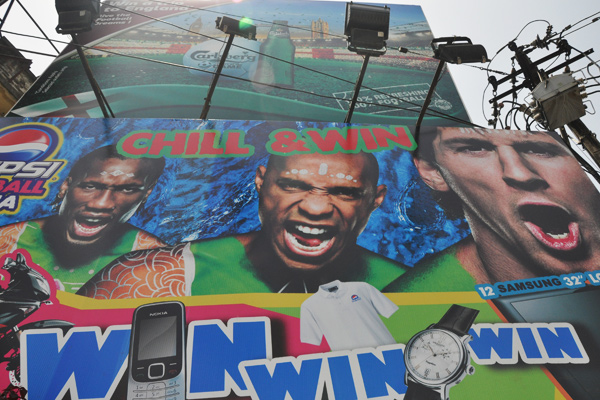
It is half past four and Comrade Pawel is already gathering his troops. Under his command, about a dozen young members of the People's Liberation Army – all clad in bright blue and yellow – are going down to the field by the river for a battle against Comrade Gurans and his dozen men.
At the Maoist cantonment in Nawalparasi, it's soccer time.
For someone who claims to have captured a couple of army barracks during the insurgency, Comrade Pawel seems quite charismatic. After getting his men together, he offered to drive a beaten down Korean van down to the field. "Sit on each others' laps and knees," he said. "We can fit all of us in here."
The boys are all thrilled because they were playing in a bigger field and they even had makeshift goal posts made from long dry bamboo woods.
"Whoever wins, buys the other team Red Bull," said one of the men. "Red Bull it is," agreed the other.
Down at the field, Comrade Gurans, captain of the other team, was already working on his team's game plan.
"Gather around," he yelled, "you know how important it is to strategize before going to a battle." Pointing his finger at his players one by one – most of them in red and black jerseys – he assigned each of their roles. "You, defense, you, defense, you, goalkeeper, you, striker…and I will play midfield," he said.
Members of the People's Liberation Army play soccer at a field in Jhyaltungdada, Nepal.
Although this country of 28 million has never reached anywhere close to the World Cup, soccer is arguably the biggest game here. Young boys can be seen kicking around soccer in almost every parts of town. Lately in bigger cities, it is hard to miss huge billboards sponsored by Samsung and Pepsi with schemes and offers for the World Cup in South Africa.
Local newspapers have already started rolling out schedule of the games, printed in attractive center-spreads. Televisions commercials feature the official FIFA anthem several times a day. Bars and cafes in Kathmandu are promoting "Live Games" on big screen televisions. Celebrities and even some busy politicians are being interviewed about where they will be watching the game and who their favorite teams are.
Truth be told, the excitement in the country is no different than that of one that actually made it to the World Cup.
A shopkeeper in Chitwan district, about 150 kilometers from Kathmandu, said his sale of instant noodles, Pepsi and Coke products have gone up after local companies announced some lucrative deals. Television stores are luring customers with free World Cup jerseys with the purchase of new television sets. One could even be entered to win an all-expenses paid trip to the games if you purchase a brand new car.
At the popular soccer outfit store in Bhadrakali in the center of Kathmandu, about a dozen men are choosing from a pile of jerseys for the Argentinean and Brazilian team.
"Is this original?" asked one man, as he pulled a yellow jersey. "Of course, it's first class material," replied the shopkeeper. The label on the jersey read "100% polyester. Made in Thailand."
It's the man's to keep for 600 rupees, roughly $8.
A storeowner at another popular store in Jawalakhel said he kept his store open on Saturday because of overwhelming demands. Jerseys for countries like Spain, Argentina and Brazil are selling fast. Most young Nepalis I spoke to consider them the favorites to win this year's championship.
The Himalayan Times, a national English daily, sponsored this billboard to advertise its coverage of the World Cup.
Down at the Maoist camp, jerseys do not matter as much as the passion for the game. "We are just excited. I hope Brazil makes history again," said Comrade Dabin, one of the men in Pawel's team.
When the game ended, Pawel's team had lost by one goal. It was Red Bull time for the other team.
"Alas, nobody brought cash with them today," said Dabin, and everyone burst into laughter.


